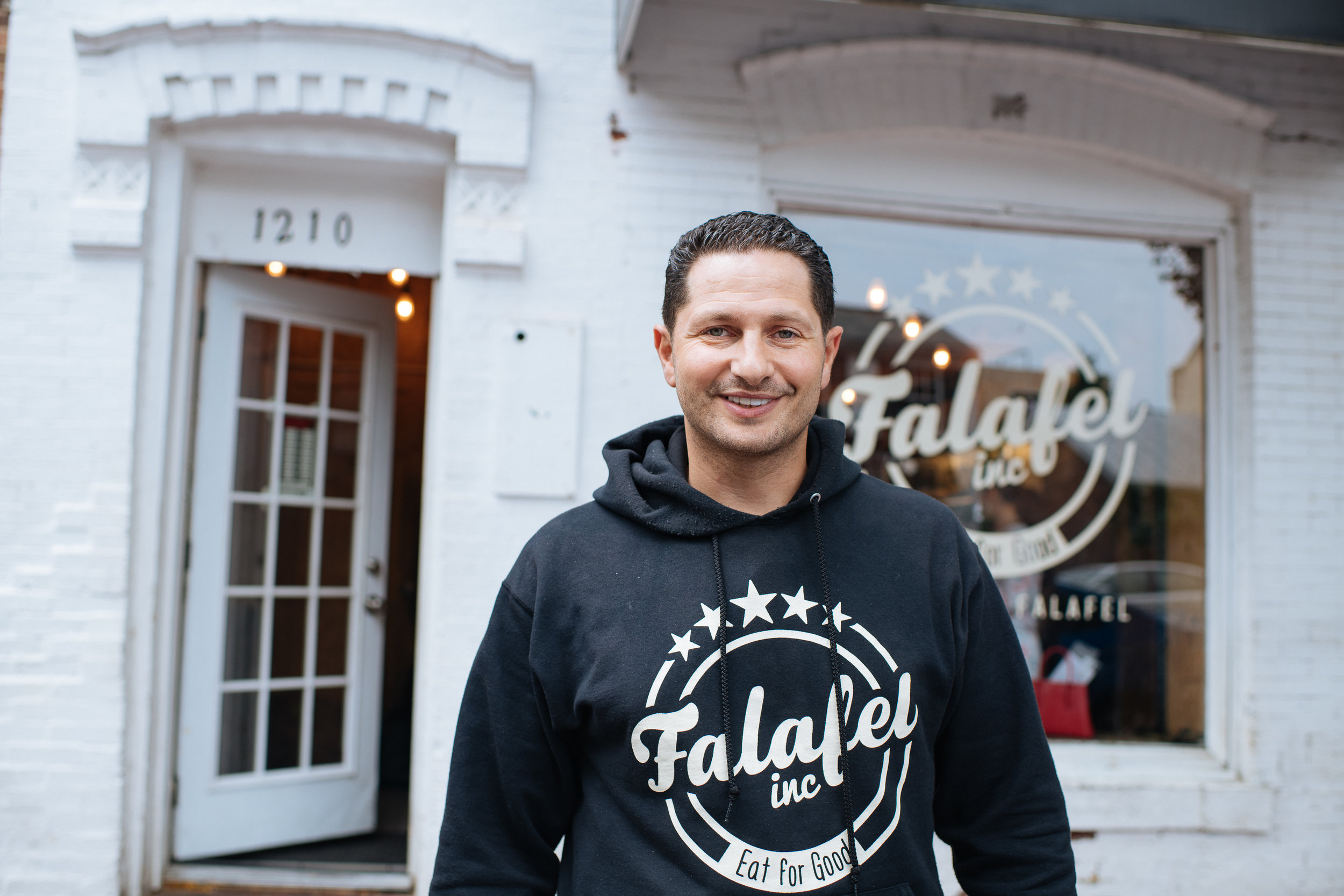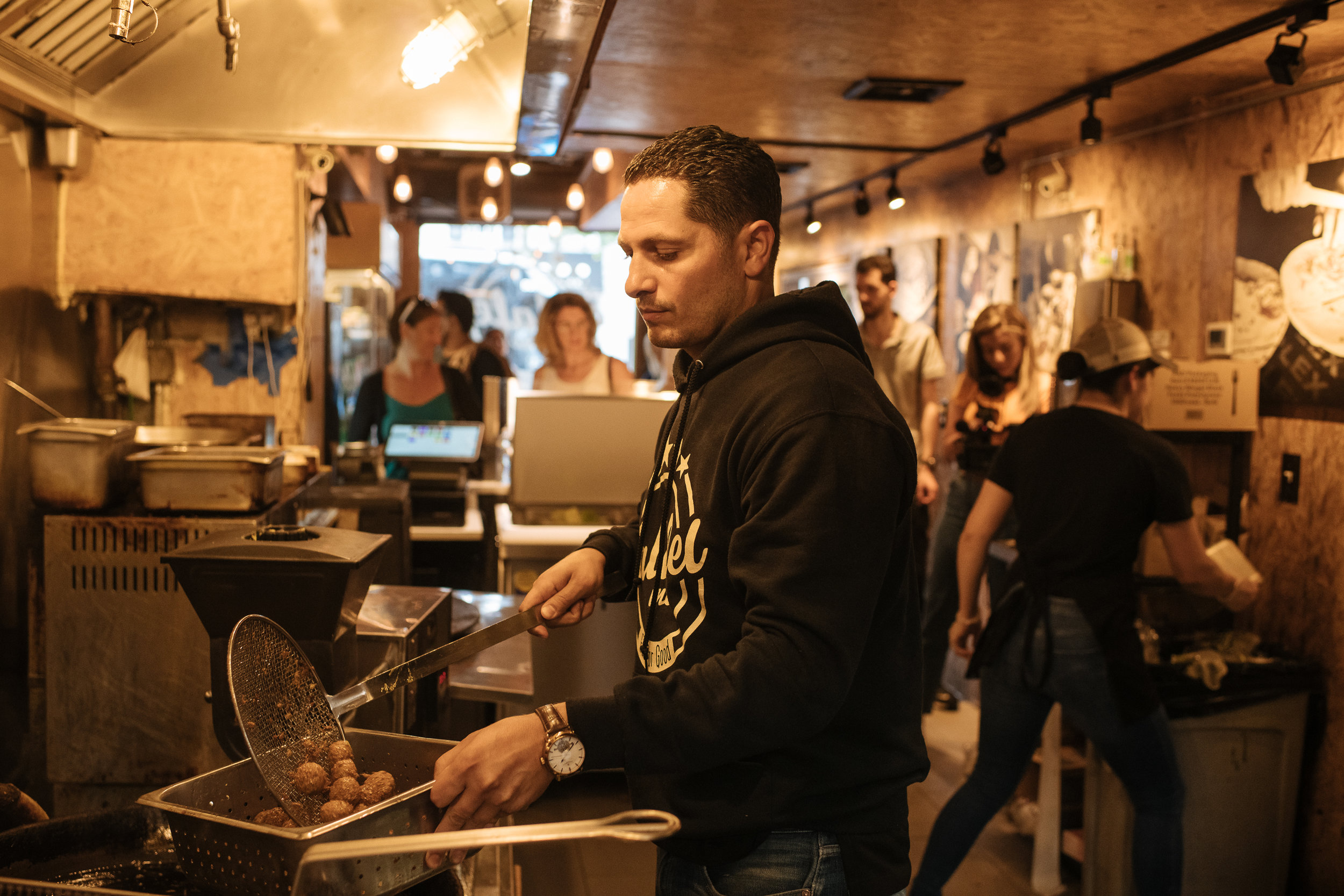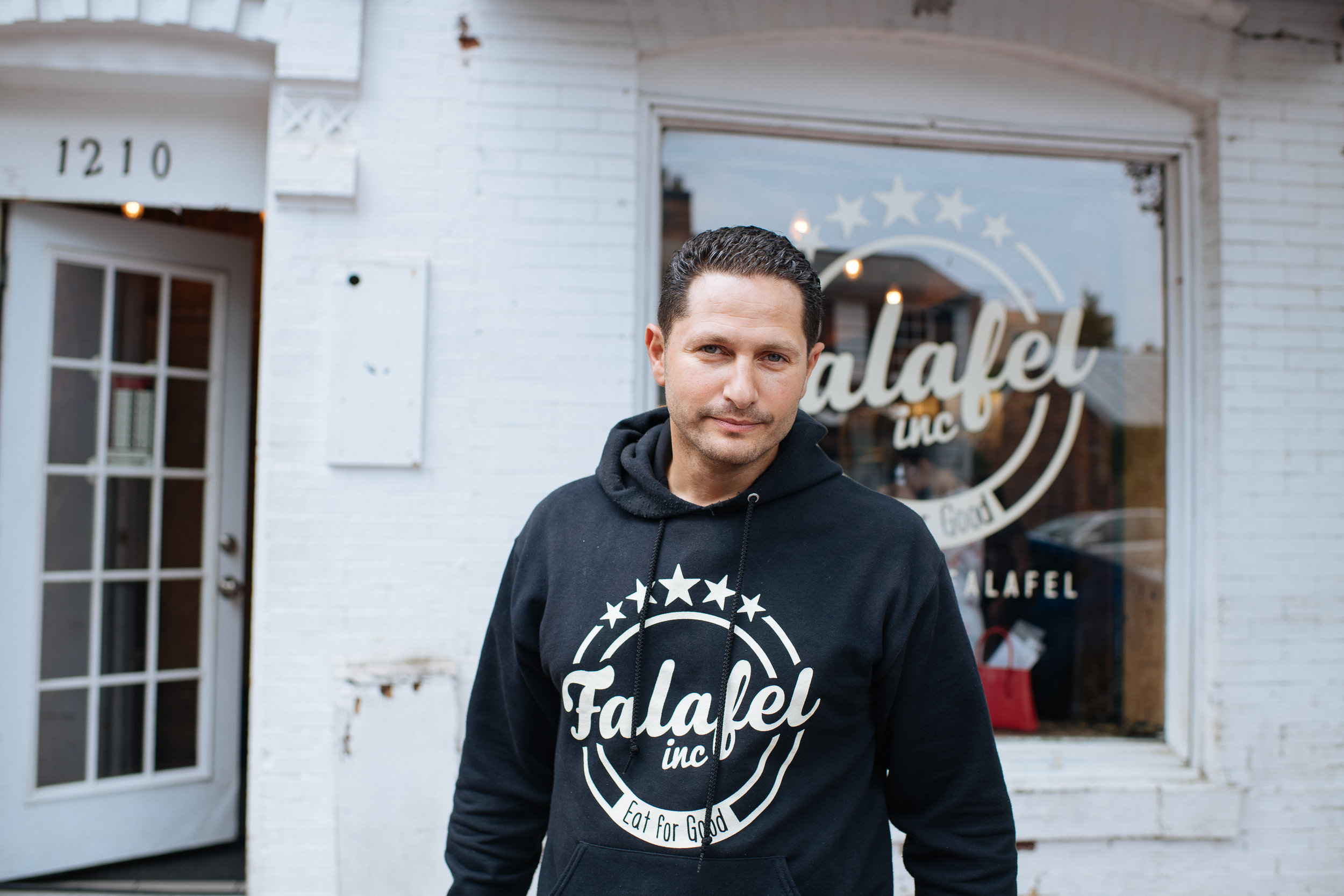‘I Wanted to Open a Badass Falafel Shop’
Ahmad Ashkar
Falafel Inc FOUNDER
Georgetown BID Board Member
In high school, Ahmad Ashkar bought a $9 falafel sandwich in DC. It was—in his words—bullshit.
‘It’s fried chickpeas, it doesn’t need to be that expensive. I was like, If I ever move to DC, I’m gonna open a badass falafel shop and make it super cheap.’
Born in Leavenworth, Kansas, to Palestinian immigrants, Ahmad grew up with good falafel. His father came to the U.S. in the 1970s to start a business, following a buddy to a neighboring town in the Midwest. By the time Ahmad and his four siblings were born, their family accounted for the entire Arabic population in a town of 60,000—an hour away from the nearest Middle Eastern restaurant.
‘My mom’s kitchen was basically a big restaurant. She used to make two or three different meals a day growing up, and we cooked with her. Every Saturday morning she made homemade falafel, pita bread, and hummus.’
Ahmad’s family moved back to the Middle East when he was seven for a few years before returning to the U.S., where Ahmad finished high school. As a teenager, he began visiting family friends in DC, and lined up internships there every summer. There was a growing Arab population, and Ahmad felt more at home that he ever had in Kansas.
‘DC was such an emerging mixing bowl of people, which is one of the reasons I ended up back here. It’s been my favorite city from the time I was in high school, and I was always a sucker for Georgetown.’
After settling in DC and marrying a native Washingtonian, Ahmad founded the Hult Prize Foundation—now the world’s biggest engine for the launch of for-good, for-profit startups emerging from colleges and universities. Over the next decade, he became an expert in innovation and scale—named one of the Top 100 Most Powerful Arabs, and GQ Magazine Brazil’s Entrepreneur of the Year.
Despite unbelievable success and accolades, Ahmad still held onto a quiet dream of opening a small falafel shop.
‘In 2016, my wife called and told me Quick Pita was going out of business. That was the local spot for Arabic food in the 90s, and one of my wife’s favorite places. She said you’ve been talking about opening a place like this since we first got married. I’m not a restaurant guy, but making food wasn’t a problem. I knew I could figure out how to scale any business.’
By early 2017, Ahmad took over the vacated Quick Pita space at 1210 Potomac St NW and converted it to Falafel Inc., building the business on a clear, impact-centered mission of feeding and employing refugees. Additionally, he was determined to make the vegan menu affordable—particularly for college students, the majority of whom he learned were malnourished throughout the U.S.
‘Most entrepreneurs want to know the maximum they can charge for their product. I went at it the completely opposite way. What’s the cheapest I can make this sandwich?’
Ahmad set a stretch goal of $2 per falafel sandwich, using a family recipe handed down from his grandmother. After running the numbers and reimaging the supply chain, it wasn’t feasible—but $3 was.
‘It’s affordable, but also strategic. The essence behind what makes good falafel is kind of like French fries—it’s fried. Whatever your favorite fries are, 10 minutes later they’ll be the worst set of French fries you’ve ever eaten. Falafel is no different. It’s fried and needs to have a great texture, and that texture goes away after an hour. I need to make it cheap so that we’re busy non-stop, and can keep fresh product going out the door.’
Two years later, Falafel Inc has had no trouble with business. Despite a menu with only two featured options—a falafel sandwich or a falafel bowl—Ahmad says their average customer comes twice a week.
‘I’m not sure what the secret is, but I think it’s the sauce mix. Or maybe it’s that it’s uber cheap, or that it’s super delicious and authentic. I’ve had a lot of my friends and family visit who remember my mom’s cooking, and they say it tastes just like her food.’
Beyond friends and family, Falafel Inc has seen an influx of college students. They’re working to finalize a deal that would enable them to accept Georgetown University money as part of the college’s meal plan, and hope to launch a new app that would give college students Falafel bucks in exchange for delivering Falafel Inc orders.
While the University customer base is unsurprising, Ahmad says he never expected the warm response he’s gotten from the Georgetown service industry.
‘All of Georgetown’s commercial district employees eat here. I almost cried one day when a Middle Eastern guy from a famous five-star hotel gave me a hug and said, ‘I’ve been working here for 15 years in the hotel industry and I’ve had to bring my lunch every single day because I can’t afford to eat out. Since you guys opened, my wife meets me and I take her to lunch at Falafel Inc.’ That’s kick-ass. That’s why people get into the food business, but the economics don’t always let them have that relationship with their customers.’
With a second location at The Wharf, a third opening in Tyson’s next week, and several international locations underway, Ahmad has no plans to expand the menu, or increase his prices anytime soon.
‘My customers know I can charge more, and still choose not to. We broke all the rules in food, and now it would be nice to see a lot more causes and businesses lining up around the idea that you can build a successful restaurant without sacrificing humanity, society, and the environment. DC is the development capital of the world, and it really could be the epicenter of a new kind of food revolution. It’s important for us to be an example of that.’




